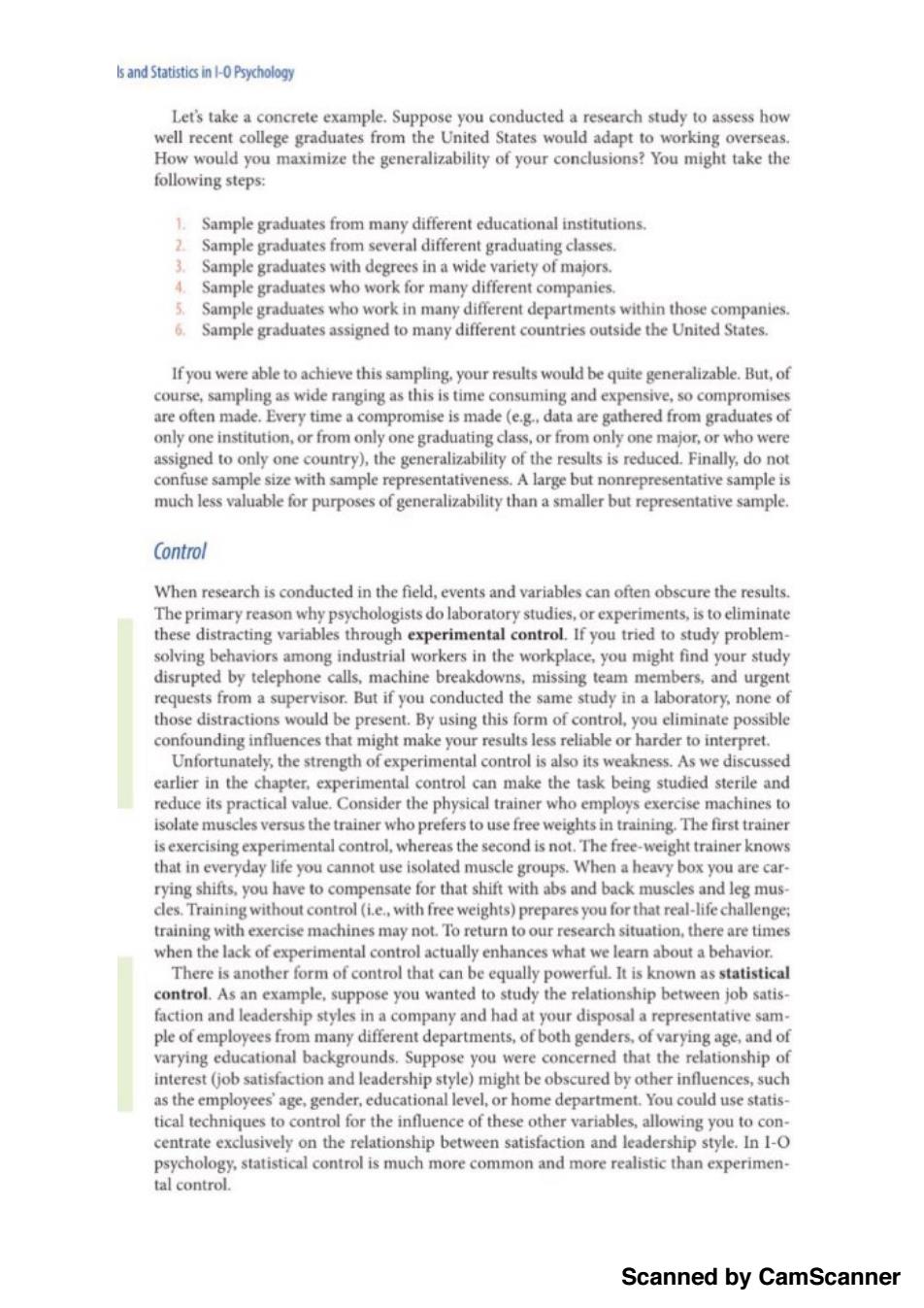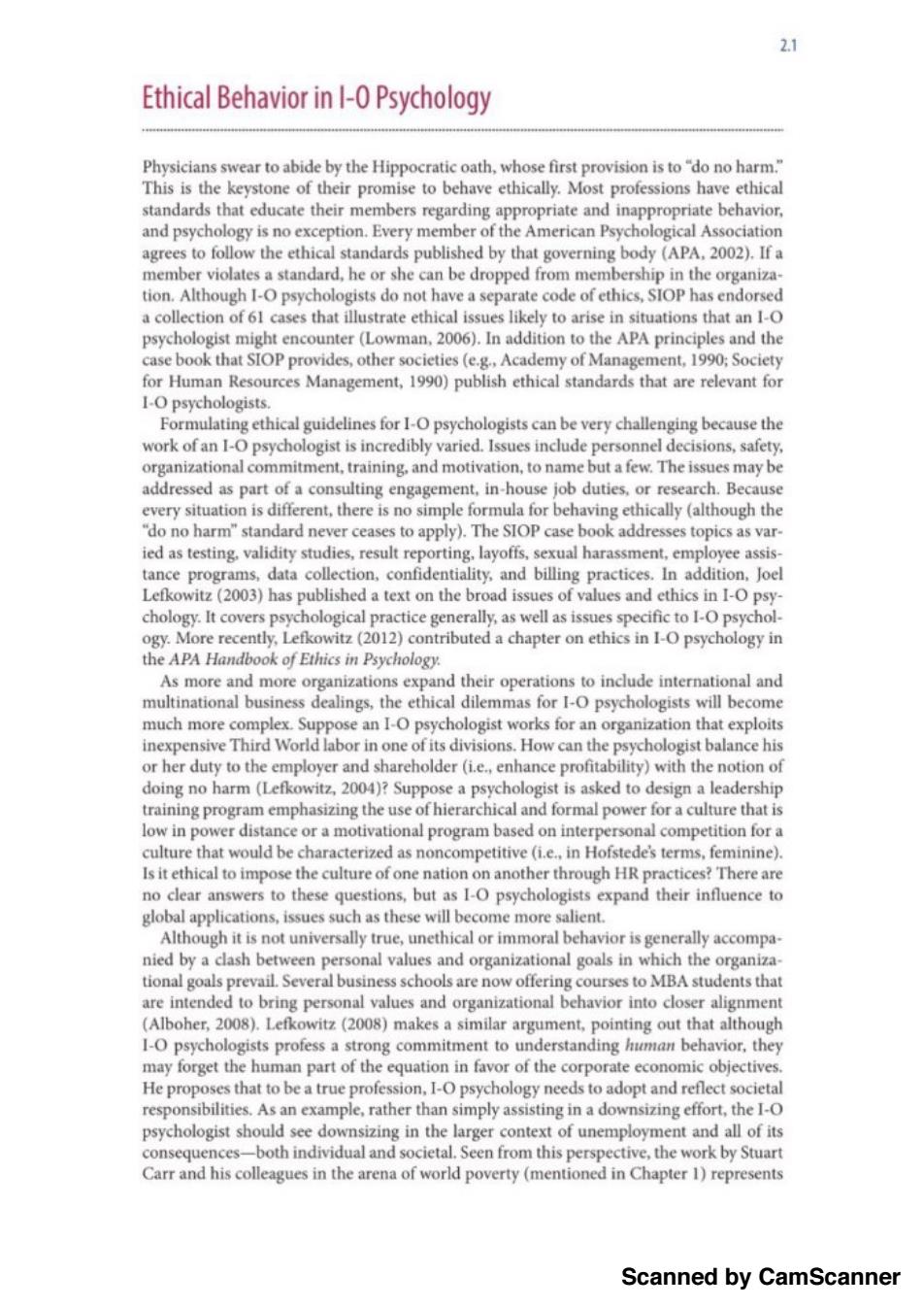
Is and Statistics in-Psychology Let's take a concrete example.Suppose you conducted a research study to assess how well recent college graduates from the United States would adapt to working overseas. How would you maximize the generalizability of your conclusions?You might take the following steps: 1. Sample graduates from many different educational institutions Sample graduates from several different graduating classes. Sample graduates with degrees in a wide variety of majors. 4 Sample graduates who work for many different companies. 5 Sample graduates who work in many different departments within those companies. Sample graduates assigned to many different countries outside the United States. If you were able to achieve this sampling,your results would be quite generalizable.But,of course,sampling as wide ranging as this is time consuming and expensive,so compromises are often made.Every time a compromise is made(e.g.,data are gathered from graduates of only one institution,or from only one graduating class,or from only one major,or who were assigned to only one country),the generalizability of the results is reduced.Finally,do not confuse sample size with sample representativeness.A large but nonrepresentative sample is much less valuable for purposes of generalizability than a smaller but representative sample. Control When research is conducted in the field,events and variables can often obscure the results. The primary reason why psychologists do laboratory studies,or experiments,is to eliminate these distracting variables through experimental control.If you tried to study problem- solving behaviors among industrial workers in the workplace,you might find your study disrupted by telephone calls,machine breakdowns,missing team members,and urgent requests from a supervisor.But if you conducted the same study in a laboratory,none of those distractions would be present.By using this form of control,you eliminate possible confounding influences that might make your results less reliable or harder to interpret. Unfortunately,the strength of experimental control is also its weakness.As we discussed earlier in the chapter,experimental control can make the task being studied sterile and reduce its practical value.Consider the physical trainer who employs exercise machines to isolate muscles versus the trainer who prefers to use free weights in training.The first trainer is exercising experimental control,whereas the second is not.The free-weight trainer knows that in everyday life you cannot use isolated muscle groups.When a heavy box you are car- rying shifts,you have to compensate for that shift with abs and back muscles and leg mus- cles.Training without control(i.e.,with free weights)prepares you for that real-life challenge: training with exercise machines may not.To return to our research situation,there are times when the lack of experimental control actually enhances what we learn about a behavior. There is another form of control that can be equally powerful.It is known as statistical control.As an example,suppose you wanted to study the relationship between job satis- faction and leadership styles in a company and had at your disposal a representative sam- ple of employees from many different departments,of both genders,of varying age,and of varying educational backgrounds.Suppose you were concerned that the relationship of interest (job satisfaction and leadership style)might be obscured by other influences,such as the employees'age,gender,educational level,or home department.You could use statis- tical techniques to control for the influence of these other variables,allowing you to con- centrate exclusively on the relationship between satisfaction and leadership style.In I-O psychology,statistical control is much more common and more realistic than experimen- tal control. Scanned by CamScanner
Scanned by CamScanner

2.1 Ethical Behavior in I-0 Psychology Physicians swear to abide by the Hippocratic oath,whose first provision is to "do no harm." This is the keystone of their promise to behave ethically.Most professions have ethical standards that educate their members regarding appropriate and inappropriate behavior, and psychology is no exception.Every member of the American Psychological Association agrees to follow the ethical standards published by that governing body (APA.2002).If a member violates a standard,he or she can be dropped from membership in the organiza- tion.Although I-O psychologists do not have a separate code of ethics,SIOP has endorsed a collection of 61 cases that illustrate ethical issues likely to arise in situations that an I-O psychologist might encounter(Lowman,2006).In addition to the APA principles and the case book that SIOP provides,other societies(e.g.,Academy of Management,1990;Society for Human Resources Management,1990)publish ethical standards that are relevant for 1-O psychologists. Formulating ethical guidelines for I-O psychologists can be very challenging because the work of an I-O psychologist is incredibly varied.Issues include personnel decisions,safety, organizational commitment,training,and motivation,to name but a few.The issues may be addressed as part of a consulting engagement,in-house job duties,or research.Because every situation is different,there is no simple formula for behaving ethically(although the "do no harm"standard never ceases to apply).The SIOP case book addresses topics as var- ied as testing,validity studies,result reporting.layoffs,sexual harassment,employee assis- tance programs,data collection,confidentiality,and billing practices.In addition,Joel Lefkowitz (2003)has published a text on the broad issues of values and ethics in I-O psy- chology.It covers psychological practice generally,as well as issues specific to I-O psychol- ogy.More recently,Lefkowitz(2012)contributed a chapter on ethics in I-O psychology in the APA Handbook of Ethics in Psychology. As more and more organizations expand their operations to include international and multinational business dealings,the ethical dilemmas for I-O psychologists will become much more complex.Suppose an I-O psychologist works for an organization that exploits inexpensive Third World labor in one of its divisions.How can the psychologist balance his or her duty to the employer and shareholder(i.e.,enhance profitability)with the notion of doing no harm(Lefkowitz,2004)?Suppose a psychologist is asked to design a leadership training program emphasizing the use of hierarchical and formal power for a culture that is low in power distance or a motivational program based on interpersonal competition for a culture that would be characterized as noncompetitive(i.e.,in Hofstede's terms,feminine). Is it ethical to impose the culture of one nation on another through HR practices?There are no clear answers to these questions,but as I-O psychologists expand their influence to global applications,issues such as these will become more salient. Although it is not universally true,unethical or immoral behavior is generally accompa- nied by a clash between personal values and organizational goals in which the organiza- tional goals prevail.Several business schools are now offering courses to MBA students that are intended to bring personal values and organizational behavior into closer alignment (Alboher,2008).Lefkowitz(2008)makes a similar argument,pointing out that although 1-0 psychologists profess a strong commitment to understanding human behavior,they may forget the human part of the equation in favor of the corporate economic objectives. He proposes that to be a true profession,I-O psychology needs to adopt and reflect societal responsibilities.As an example,rather than simply assisting in a downsizing effort,the I-O psychologist should see downsizing in the larger context of unemployment and all of its consequences-both individual and societal.Seen from this perspective,the work by Stuart Carr and his colleagues in the arena of world poverty (mentioned in Chapter 1)represents Scanned by CamScanner
Scanned by CamScanner